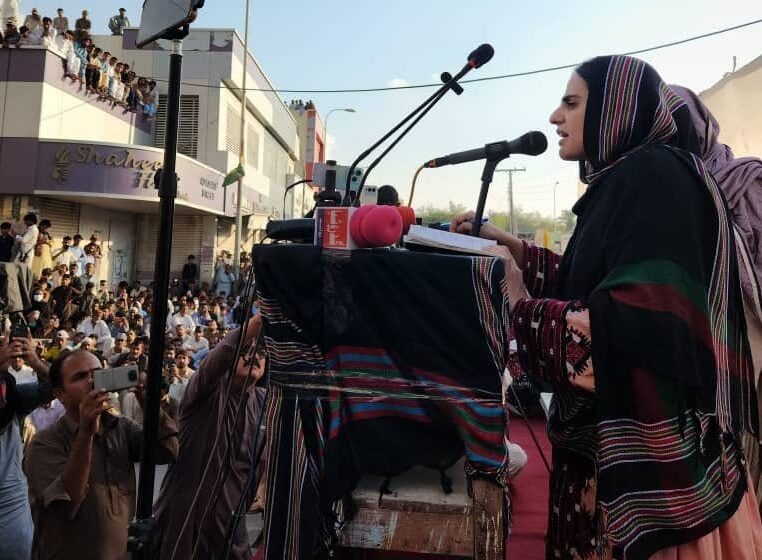Indian State Should Focus on Unconventional Methods: Jamal Nasir Baloch
Balochistan: Seminar Marks First Anniversary of Shaheed Balach Mola Bakhsh’s Martyrdom

QUETTA – The BYC (Baloch Yakjehti Committee) organised a seminar on the first anniversary of Shaheed Balach Mola Bakhsh’s martyrdom at Shaheed Fida Chowk, Turbat, on November 24, Sunday evening.
The event saw a large turnout of people from various walks of life, including lawyers, political leaders, and citizens from across Balochistan, who gathered to pay tribute to the slain activist and discuss the ongoing struggles of the Baloch people.
Dr. Mahrang Baloch, the central organiser of the Baloch Yakjehti Committee (Baloch Solidarity Committee), addressed the gathering, saying that the state has adopted policies of exploitation and genocide against the Baloch people. “The state has been following two main policies: one is the looting of Baloch resources, and the other is the genocide of the Baloch people,” Dr. Mahrang said, emphasising the dire need for the Baloch to unite and organise against these policies.
In her speech, she highlighted the continuous violence faced by the Baloch people, mentioning that for the past two decades, bodies of the disappeared have been found daily in Balochistan. She recalled the abandonment of Shaheed Balach’s body, noting that despite the state’s attempt to bury him quietly, his family chose to protest rather than stay silent. From November 23 to December 6, 2023, they staged a sit-in in Turbat with his body, followed by a long march from Turbat to Islamabad, which Dr. Mahrang said symbolised a renewed commitment to the struggle.
She further condemned the state’s continued oppression, stating that over 200 young Baloch have been forcibly disappeared in the past year alone. “Every Baloch household has become a place of pain,” she added. Despite this ongoing violence, Dr. Mahrang criticised Pakistan’s intellectuals and journalists who are calling for harsh military operations in Balochistan, urging Baloch people to rise above fear and unite to resist the genocide. She also called on the Baloch nation to prepare for the “hardest sacrifices” in the fight for justice.
The seminar also featured remarks from key figures, including Meherab Khan Gachki Advocate, President of the Makran High Court Bar, who condemned enforced disappearances as a grave violation of both national and international laws. He pointed out that similar practices in Bengal in the past had disastrous consequences, which are now being repeated in Balochistan.
Abdul Majid Shah Advocate, President of the Kech Bar, also criticised the state’s operations, adding that no military action over the past 70 years has improved the situation in Balochistan. “Instead, the situation has only worsened,” he said.
Sibtullah Shah Ji, a leader of the BYC, spoke on how Shaheed Balach’s martyrdom had inspired a new wave of determination in the Baloch struggle. He appealed to the [Baloch] public to remain united and thwart the state’s conspiracies.
Abdul Majid Dashti Advocate highlighted the need for the BYC to bring Baloch issues to the international stage, suggesting that a team be formed to represent the Baloch cause in the International Court of Justice.
In a poignant moment, Younis Baloch, the brother of Shaheed Balach, and Mujeeb Rahim honoured the martyrs with heartfelt poetry. The speakers concluded the event by vowing to continue the fight for the rights and justice of the Baloch people, stressing that Shaheed Balach’s sacrifice had ignited a renewed passion for resistance among the Baloch, leading to a well-organised, united movement against state atrocities.
Dr. Mahrang Baloch warned that if the Baloch remain silent, they will face further suffering, including displacement and destruction of their homes, citing the ongoing situation in Awaran as a stark example.
She mentioned that despite the ongoing protests for the recovery of Diljan in Awaran, a Baloch woman working for the government had threatened Diljan’s elderly father, encouraging violence to clear the way.
The seminar concluded with a call for unity and resistance, with Dr. Mahrang stressing that while state measures like the Fourth Schedule and Section 144 may intimidate others, the Baloch are unafraid and determined to continue their struggle for justice.









